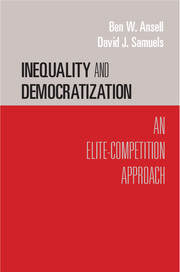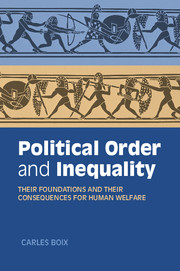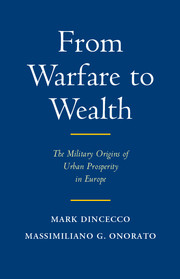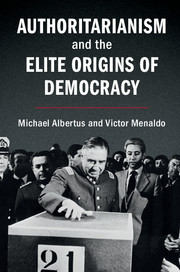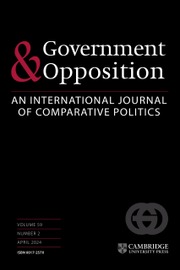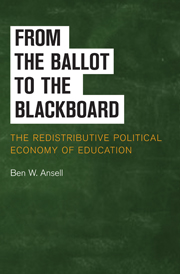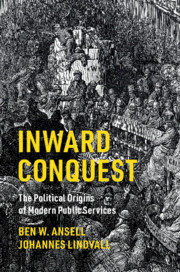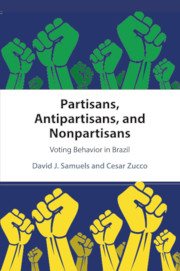Inequality and Democratization
An Elite-Competition Approach
Part of Cambridge Studies in Comparative Politics
- Authors:
- Ben W. Ansell, University of Oxford
- David J. Samuels, University of Minnesota
- Date Published: February 2015
- availability: Available
- format: Paperback
- isbn: 9780521168793
Paperback
Other available formats:
Hardback, eBook
Looking for an inspection copy?
This title is not currently available on inspection
-
Research on the economic origins of democracy and dictatorship has shifted away from the impact of growth and turned toward the question of how different patterns of growth - equal or unequal - shape regime change. This book offers a new theory of the historical relationship between economic modernization and the emergence of democracy on a global scale, focusing on the effects of land and income inequality. Contrary to most mainstream arguments, Ben W. Ansell and David J. Samuels suggest that democracy is more likely to emerge when rising, yet politically disenfranchised, groups demand more influence because they have more to lose, rather than when threats of redistribution to elite interests are low.
Read more- Utilizes multiple methods to analyze the causes of democratization and public spending and what public opinion is on both
- Provides a critical counterpoint to major recent analyses of inequality and democratization
- Expands upon the authors' article, which won the 2010 Best Article Award from APSA's Comparative Democratization Section
Awards
- Winner, 2015 Woodrow Wilson Foundation Award, American Political Science Association
Reviews & endorsements
'This gem of a book engages with one of the fundamental relationships in political economy: the relationship between democratization and inequality. The received wisdom is that inequality serves as a brake on democratization because the autocratic elites fear the redistributive demands of the poor median voter. Ansell and Samuels offer an illuminating new approach - the elite-competition approach - and rigorously argue that rising income inequality, in fact, fosters democratization as emerging economic groups demand political influence to insure against the old autocratic elite's power to expropriate their income and assets. The book is a major contribution to the field of political economy that will inspire and challenge researchers and students alike.' Toke Aidt, University of Cambridge
See more reviews'[Inequality and Democratization] challenges the widely believed claim that demand for redistribution motivates democratization. Ansell and Samuels assemble very persuasive evidence to support their arguments. This is path-breaking research that will change the way social scientists think about one of the really big questions.' Barbara Geddes, University of California, Los Angeles
'In this book, Ansell and Samuels explicitly challenge received wisdom about democratization based on redistributive motives. These works emphasize democracy as a threat to property. Ansell and Samuels draw on ideas of liberalism and the enlightenment, such as Locke on the need to control the arbitrary behavior of governments. This approach suggests that democratization may result when property interests seek constraints on arbitrary or predatory government. Ansell and Samuels are sure to join the ranks of Acemoglu and Robinson, Boix, and Przeworski in furthering our understanding of democratization.' Barry R. Weingast, Stanford University
'… an important and much-needed contrition to the study of inequality and democratization … a must-read for students and scholars interested in inequality …' Nils B. Weidmann, Reviews and Critical Commentary
Customer reviews
Not yet reviewed
Be the first to review
Review was not posted due to profanity
×Product details
- Date Published: February 2015
- format: Paperback
- isbn: 9780521168793
- length: 254 pages
- dimensions: 226 x 150 x 18 mm
- weight: 0.34kg
- contains: 26 b/w illus. 43 tables
- availability: Available
Table of Contents
1. Introduction
2. Inequality, development, and distribution
3. Actors and interests
4. An elite-competition model of democratization
5. Assessing the relationship between inequality and democratization
6. Inequality and democratization: empirical extensions
7. Democracy, inequality, and public spending: reassessing the evidence
8. Democracy, redistribution, and preferences
9. Conclusion.
An Interview with David J. Samuels and Ben W. Ansell
Sorry, this resource is locked
Please register or sign in to request access. If you are having problems accessing these resources please email [email protected]
Register Sign in» Proceed
You are now leaving the Cambridge University Press website. Your eBook purchase and download will be completed by our partner www.ebooks.com. Please see the permission section of the www.ebooks.com catalogue page for details of the print & copy limits on our eBooks.
Continue ×Are you sure you want to delete your account?
This cannot be undone.
Thank you for your feedback which will help us improve our service.
If you requested a response, we will make sure to get back to you shortly.
×
